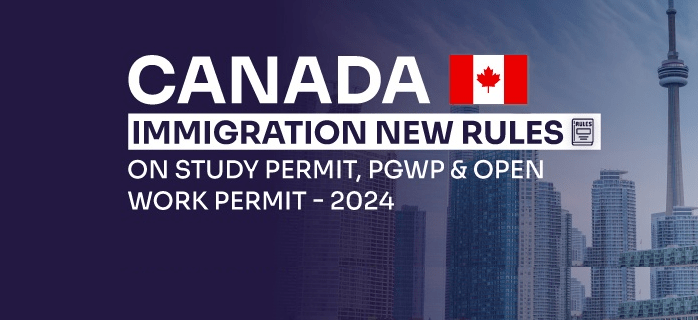On September 18, 2024, Canada announced major changes to the Post-Graduation Work Permit (PGWP) program, which will take effect on November 1, 2024. This program is crucial for international students seeking to gain valuable work experience after completing their studies. This article outlines the upcoming changes, what remains the same, and key eligibility details that will affect international students.
New Study Permit Cap for 2025
Understanding the Reduction
For 2025, Immigration, Refugees, and Citizenship Canada (IRCC) will cap the number of study permits issued at 437,000. This represents a 10% decrease from the 2024 target of 485,000. This new cap is expected to remain in effect through 2026, resulting in approximately 300,000 fewer study permits over the next few years.
What Remains Unchanged in PGWP Rules
While there are significant updates, some core eligibility requirements for the PGWP will remain the same:
- Designated Learning Institution (DLI): Students must complete their program at a PGWP-eligible DLI.
- Physical Presence in Canada: Students must be physically present in Canada for the majority of their program.
- Existing Applications: Applications submitted before November 1, 2024, will not be affected by these changes.
- Flight School Graduates: Graduates from PGWP-eligible flight schools are exempt from the new requirements.
New PGWP Eligibility Criteria Effective November 1, 2024
If you plan to apply for a PGWP after the new rules take effect, here’s what you need to know:
For Students Who Applied for Study Permits Before November 1, 2024
- University Graduates (Bachelor’s, Master’s, Doctoral): A minimum Canadian Language Benchmark (CLB) 7 (or NCLC 7 for French) in all language areas (reading, writing, listening, speaking) is required.
- Other University Programs: The same CLB 7 requirement applies.
- College Programs: A minimum language score of CLB 5 (or NCLC 5 for French) is necessary.
For Students Applying for Study Permits On or After November 1, 2024
- University Graduates: Must demonstrate proficiency with a minimum CLB 7 in all language areas, with no restrictions based on field of study.
- Other University Programs: Must meet the CLB 7 requirement, with fields of study in high demand in Canada.
- College Graduates: Need a minimum CLB 5 in all areas, with studies linked to occupations facing long-term shortages.
Language Tests and Proficiency Requirements
Under the new PGWP rules, language proficiency is crucial for eligibility. Applicants must take an approved language test, with results no older than two years. Accepted tests include:
- English Tests: CELPIP-General, IELTS General Training, PTE Core.
- French Tests: Must meet corresponding NCLC standards.
New Field of Study Requirements
The updated PGWP regulations now connect certain study programs to fields facing long-term labor shortages in Canada. Examples include:
Agriculture and Agri-Food
- Agriculture, General (CIP Code: 01.0000)
- Agronomy and Crop Science (CIP Code: 01.1102)
Healthcare
- Veterinary Sciences (CIP Code: 01.8101)
- Exercise Science and Kinesiology (CIP Code: 31.0505)
STEM (Science, Technology, Engineering, and Math)
- Molecular Genetics (CIP Code: 26.0802)
- Computer Science (CIP Code: 11.0701)
Trades
- Meat Cutting (CIP Code: 12.0506)
- Plant Nursery Operations (CIP Code: 01.0606)
Transportation
- Aircraft Pilot (CIP Code: 49.0102)
- Heavy Equipment Operation (CIP Code: 49.0205)
Ensure you verify your program’s CIP code for eligibility.
Changes to Spousal Work Permits
Significant changes also apply to Spousal Open Work Permits (SOWP). Under the new rules, spousal work permits will now be restricted to:
- Spouses of master’s program students whose programs last at least 16 months.
- Spouses of doctoral students.
- Spouses of students in select professional or pilot programs.
Additionally, eligibility for spousal work permits will now be limited to spouses of highly skilled professionals in critical sectors like healthcare and construction. This change is expected to reduce the number of spousal work permits issued by 50,000 over the next three years.
Adjustments to the Temporary Foreign Worker Program (TFWP)
In light of rising unemployment rates in Canada, currently at 6.6% (as of August 2024), the government is making adjustments to the TFWP. These changes aim to address genuine labor shortages while ensuring that Canadian workers are not displaced and wages are not suppressed.
Need Help Preparing for the New PGWP Rules?
With these changes on the horizon, international students must plan strategically. Ensure your study program aligns with the new PGWP eligibility criteria and be prepared to meet the language proficiency requirements. Consulting your educational institution can help you navigate these updates successfully.
Schedule a Consultation
For personalized guidance on the new PGWP rules, study permits, work permits, and pathways to permanent residency, contact Visas Abroad Services LLP. Our experienced Canadian immigration experts are dedicated to helping you prepare the strongest application possible, maximizing your chances of success.
By staying informed and prepared, you can take full advantage of the opportunities that Canada offers for international students.
